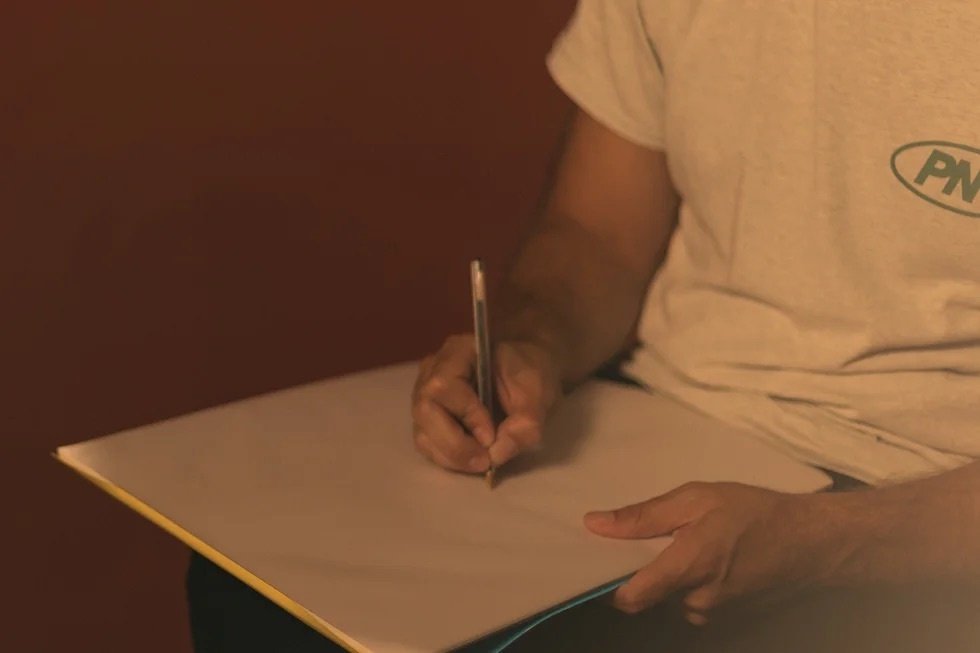Slacker vs. control freak: What’s your interview style?
24. 9. 2024
6 min.


Freelance translator and journalist
A job interview is the one time during a recruitment process when you have a perfect opportunity to show your personality to the recruiter. It’s also when you see your true character in action—for better or worse. To help you identify how you come across at an interview, we’ve drawn up a list of common—only slightly exaggerated—personality types. Which one are you?
1. The bundle of nerves
While everyone experiences some stress before a job interview, you’re practically an Olympic champion. Stressed? Check. Low confidence? Double check. Every step of the hiring process gives you sweaty palms and knots in your stomach. When it’s time to talk about your experience, it feels like your brain has gone on vacation, leaving your mouth to babble incoherently. It’s hard for recruiters to get to know you when, instead of happily highlighting your skills and motivation, you can’t think of anything but your own pounding heart.
Taking plenty of deep breaths, being prepared, rehearsing what you plan to say in the interview (and maybe even going to therapy) can help you channel these volatile emotions. So breathe!
2. The control freak
You believe an interview is a serious business and nothing can be allowed to get in the way of your concentration. Everything has to run like clockwork. You plan the best route to the interview, noting alternatives in case the traffic is bad. You wear an outfit perfectly suited to the weather and the company’s dress code, which you researched on LinkedIn. You have notes on the company’s history, a list of questions to ask, the salary you want, and details of the recruiter’s life pieced together from old Facebook statuses and TikTok likes. You almost blur the line between being super organized—and kind of creepy.
Of course, it’s better not to show up empty-handed, but remember, the person interviewing you is also human. Kudos for your preparation, which shows motivation, but don’t try to anticipate every tiny detail. Leave some room for spontaneity, or you might come across as the best-dressed robot during the interview. Plus, it would be a shame to miss out on meeting Marty, the beloved office goldfish. (You know about him, of course, because you found out every last detail about the company.)
3. The slacker
Your warmth is matched only by your laziness. You show up for a job interview cool as a cucumber. It’s like you just saw a light on in the office and knocked on the door by chance. Your life doesn’t depend on this job. You’ll be happy whether you get it or not. You think all companies are the same with their open-plan spaces, foosball tables, coffee machines, and bad jokes. You dream of a life far from work. There’s no way you’re going to kill yourself by submitting a personalized application or conducting in-depth research on the company. In five years, you see yourself retiring early and moving to the mountains. What’s motivating you to apply for the job then? The amazing healthcare and benefits.
If asked about your weaknesses, avoid saying, “I’m a bit lazy” or “I struggle to get going in the mornings.” Opt for interview lingo instead: “Sometimes, it’s challenging for me to set priorities.” (This is true, of course, except when it comes to deciding between taking a nap or creating a PowerPoint. So don’t say that.)
4. The artful dodger
“My weaknesses? What a great question! You know, I’m always motivated and eager for a new challenge! By the way, did I tell you about the time I…”
While most candidates hone their answers so they can shine in interviews, you’ve chosen the path of evasion and mastered the art of slipping through the cracks. With vague answers and subtle detours, you’re as smooth with words as a magician is with cards.
Here are just some of your favorite tricks:
- Avoiding the question: “That’s a question worthy of a thesis. I’ll let you enlighten me!”
- Saying you can’t answer: “Where do I see myself in five years? Ah, the mystery of the future. As Forrest Gump put it, ‘Life is like a box of chocolates,’ but what I can tell you is that right now, I’m determined to…”
- Self-interruption: “Yes, I’ll tell you about my previous experience. By the way, I forgot to mention that…”
By the end of the interview, the HR manager is left in a fog. They know nothing about your education or your professional life. One thing is certain, though: your greatest talent is verbal gymnastics. And your biggest flaw? Charm without substance. Sorry, but you’re fooling no one.
5. The flirt
The professional equivalent of a person in a relationship who flirts at every opportunity to reassure themselves of their appeal, you show up for interviews to boost your ego. You’ve been with your company for five years and are perfectly happy. You’ve had your ups and downs, but you’re as solid as a couple watching Netflix on a Sunday night. You’ve applied to and accepted the interview at this company, but you don’t plan to go any further. You did this to break the monotony, flutter your eyelashes, and check your market value. The extra $10K a year the other company is offering is quite enticing. You might mention it to your manager—you deserve to be fought over.
6. The truth teller
Some interviewees sugarcoat the truth. Not you though. You’re 100% honest. It’s better to be hired for who you are, right? Why did you leave your previous company? Because your manager didn’t see your immense potential.
What motivates you about this new opportunity? Honestly, the salary isn’t bad, and the benefits are good too. Your biggest flaw? A little direct, but that’s part of your charm. You don’t mind asking if you can take vacation days during the first six months of being hired because you’ve planned a road trip with your childhood friend, a tradition as sacred as happy hour on Friday. Also, by the way, you need to leave at 5pm every Thursday to see your therapist.
While honesty is a virtue, don’t lose sight of professional boundaries; diplomacy is your ally. It’s better to sell dreams than nightmares, right?
7. Voted most popular
Arriving at the company for your interview, you feel completely at home. As you step into the office, you recognize the graphic designer you worked with before and the brilliant project manager from your former company. Like a politician on a campaign trail, you shake hands left and right, and share a few knowing winks. You’re convinced your former coworkers will give you the support you need to land this coveted position. You think the recruiter will quickly realize you know the company’s organizational chart better than they do. You think you’re home and on solid ground.
The advantage of having a network is that your contacts can vouch for you and give you valuable information about the company and the job. However, be careful not to be overconfident and don’t neglect your preparation.
8. The desperado
This interview is vital. You’re bored to tears at your current company. Your manager is as lively as a tree stump, you’re underpaid, and your coworkers are shallow. You need an escape and are ready to accept anything to get out of this trap. Your recruiter isn’t just someone with a job offer, but a hero who can save you. You answer their questions without showing too much misery, but each of your responses is tinged with silent pleading, “I’m begging you. Hire me!”
You’re trying to get out of an uncomfortable or toxic situation at your current workplace, and that’s a good thing. However, be careful, recruiters can tell when a candidate’s real motivation is to flee a company rather than to join theirs. Even if it’s difficult, put on a brave face—at least until the end of the interview.
9. The shrinking violet
If there’s one time in your life when you need to sell yourself, it’s in a job interview. You can’t shake your impostor syndrome though. You say you have “15 years of experience,” even though the truth is that you single-handedly managed a complete revamp of your previous company’s website and ran an entire marketing campaign at the same time. Oh, you were also nominated for Top Chef, but you’re not going to put that on your resume.
Filmmaker Orson Welles once said, “Nobody who takes on anything big and tough can afford to be modest.” You need to promote yourself. It’s okay to boast about your accomplishments. You’re awesome.
10. The Ted Talk wannabe
You’re tired of the classic question-answer interview. Welcome to your Ted Talk. Ready to captivate your audience, you launch into a monologue about the meaning you find in work. Each of your professional achievements is compared to a great historical battle. Every failure comes with a lesson. Your speech is filled with punchlines like, “Looking for someone who thinks outside the box? Well, I’ve never even seen the box!” Then there are the cheesy phrases like, “I’m stronger because of my failures, not despite them.” Your confidence seems to be having an effect on the recruiter, who looks like they’re deep in thought—though perhaps they’re just wondering if they’ll ever get back the 15 minutes of their life they spent listening to your ramblings.
Easy on the ego! Yes, you have to sell yourself, but not at the expense of authenticity and approachability. An interview is meant to be a conversation, not an opportunity for you to perform a stand-up routine.
Photo: Welcome to the Jungle
Follow Welcome to the Jungle on Facebook, LinkedIn, and Instagram and subscribe to our newsletter to get our latest articles every week!

Další inspirace: Příprava na pohovor

Hybrid work goals: How to nail the negotiation in your next job interview
Want a hybrid work setup? Learn how to research, negotiate, and showcase the benefits of flexibility during your next job interview.
19. 12. 2024

The secret to interview success? That annoying colleague
Got a story about a difficult coworker? Good! That office drama might just be your ticket to acing your next interview.
16. 12. 2024

Is flexibility the key to “having it all” as a parent?
Balancing a career and parenthood can be challenging, but with the right approach, it’s possible to achieve both.
08. 10. 2024

Overcoming neurotypical norms during the job hunt
Neurodiverse individuals bring valuable innovation and should be more included in the workplace. How can we embrace their unique talents?
23. 9. 2024

It’s time for inclusive holiday PTO: How can you advocate for it?
As the workforce becomes more diverse, companies should let employees take time for the holidays that matter to them
19. 9. 2024
Zpravodaj, který stojí za to
Chcete držet krok s nejnovějšími články? Dvakrát týdně můžete do své poštovní schránky dostávat zajímavé příběhy, nabídky na práce a další tipy.

Hledáte svou další pracovní příležitost?
Více než 200 000 kandidátů našlo práci s Welcome to the Jungle
Prozkoumat pracovní místa